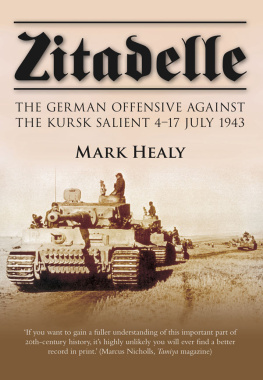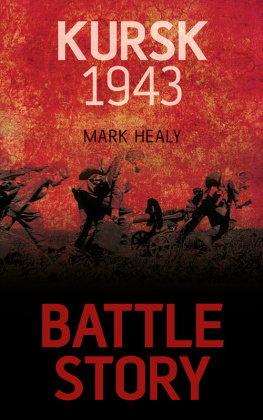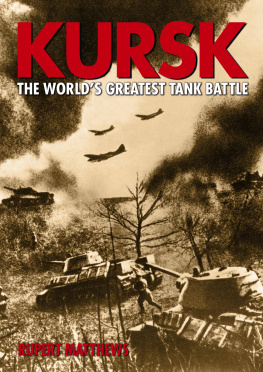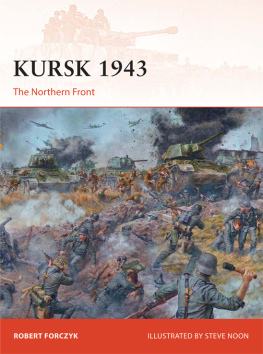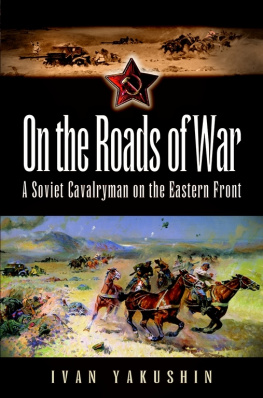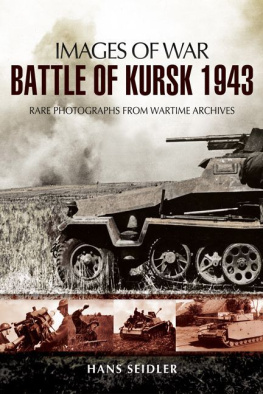Zitadelle
Zitadelle
THE GERMAN OFFENSIVE AGAINST
THE KURSK SALIENT 417 JULY 1943
MARK HEALY

For Eileen and Ron,
For their many kindnesses over the years.
First published 2008
This paperback edition published 2010
by Spellmount, The History Press Ltd
The Mill, Brimscombe Port
Stroud, Gloucestershire, GL5 2QG
www.thehistorypress.co.uk
This ebook edition first published in 2016
All rights reserved
Mark Healy, 2008, 2010
The right of Mark Healy to be identified as the Author of this work has been asserted in accordance with the Copyrights, Designs and Patents Act 1988.
This ebook is copyright material and must not be copied, reproduced, transferred, distributed, leased, licensed or publicly performed or used in any way except as specifically permitted in writing by the publishers, as allowed under the terms and conditions under which it was purchased or as strictly permitted by applicable copyright law. Any unauthorised distribution or use of this text may be a direct infringement of the authors and publishers rights, and those responsible may be liable in law accordingly.
Aircraft profile on page 11 of the colour section, below, courtesy of Osprey Publishing, Oxford, UK, from Jagdgeschwader 52: The Experten, John Weal (Aviation Elite Units 15)
EPUB ISBN 978 0 7509 7957 3
Typesetting and origination by The History Press Ltd.
eBook converted by Geethik Technologies
CONTENTS
INTRODUCTION
T his is the second book I have written on the Battle of Kursk. The first, published in 1992 and still in print, reflected the state of knowledge available at the time. It therefore contains errors of fact and interpretation. Much in the way of new information has become available since and this has led to the publication of a number of titles addressing this great clash between the Ostheer and the Red Army in the summer of 1943. This has permitted a far more accurate picture of the antecedents of this battle, and of its course and importance, to be offered to the reading public.
A number of these texts are of significance. Published in 1999 was the Battle of Kursk by Col David Glantz and Jonathan House. In this work, the authors chose to address the subject mainly from the Soviet perspective and this benefited from the immense knowledge and expertise of the former deriving from his many years of unprecedented access to, and study of, the archives of the Red Army. Another book, by Niklas Zetterling and Anders Frankson published in 2000, offers a remarkable statistical analysis of the battle and is unlikely to be surpassed in the manner of its treatment of the subject. Of great importance also, is that by Professor Steven Newton who has re-translated and provided his own critical commentary of the almost forgotten documentation commissioned by the US Army after the war from senior Wehrmacht staff who directly participated in or were otherwise involved in the Kursk offensive. His book serves to bring clarification to a number of still controversial aspects of the battle. All of these books are deserving of serious study.
Coming from a different perspective are the remarkable text and photo books published by J.J.Fedorowicz Publishing in Canada. This company specialises in unit histories of the German Army and the Waffen SS. They have released a number of publications concerning Zitadelle, the most significant being the two-volume set by J.Restayn and N.Moller. Products of many years of research, these two volumes address operations in the north and south of the salient respectively. They contain a large number of new photographs and present an unforgettable image of the scale of the battle. In addition, RZM publishers have released a six-volume photo coverage of the battle employing recently discovered film taken by PK cameraman who operated with II SS Panzer Corps during the battle. Given the frequency with which new pictures are still being discovered in private archives in Germany, it makes one wonder how many Wehrmacht servicemen did not take a Leica camera to war with them!
So, given the number of recent texts published on the subject of Kursk, why another? In the first instance, Kursk is an evergreen subject and thus generates a seemingly inexhaustible fascination. This stems primarily from its perceived status as the greatest tank battle in history, the head-on clash of the II SS Panzer Corps and 5th Guards Tank Army in the fields around Prokhorovka on 12 July 1943 having acquired an almost mythic reputation. As with all myths, the reality is somewhat less grandiose but no less dramatic for the re-telling. However, what in particular has motivated me is the question that has always nagged whenever I have considered this battle: why did the Germans bother? This was especially so, as by the time Zitadelle was finally launched in early July, what had been deemed in March to be the essential pre-condition for its success that it be launched at the earliest opportunity after the ground was dry in the spring had long since fallen by the wayside. Indeed, why did the Germans persist with an operation that, like topsy, had grown and grown with scarce military assets committed to it, and when professional military opinion was being expressed that the possibility of a successful outcome was receding the longer the delay in launching it? I hope I have produced a credible answer here.
Nor has it traditionally been possible to identify who was responsible for the delay of the attack date from early May to the beginning of July. In this matter, the testimony of many of the surviving senior participants is dubious inasmuch as many employed their memoirs to re-write their role in the planning process and shift the blame for Zitadelles failure on to others. Failure is an orphan and no one wishes to claim parenthood! The traditional scapegoat has always been General Zeitzler the Chief of Staff of the Army (OKH). Whilst he was an early and strong advocate for the offensive, and was responsible, with Hitler, for formulating Operational Orders 5 and 6 which provided the primary documentation for Zitadelle it is no longer possible to impute to him responsibility for all that transpired after May 5, 1943.
On that date, Hitler held a meeting in Munich to discuss the implications of evidence provided by General Model of enemy preparations in the Kursk salient, with the leading lights of the operation. This clearly indicated that the Soviet intention was to engage the Germans in a strategic defensive rather than employ the salient as the springboard for a major offensive directed against Army Group South, as the rationale for Zitadelle had always presumed. According to General Busse, the Chief of Staff of Army Group South, who attended a pre-conference discussion between Zeitzler and von Field Marshal Erich von Manstein, the Chief of the OKH was adamant that the launch date of the offensive ought not to be delayed, at least not beyond the end of May. Busse states in his transcript, which provides the only verbatim report of the conference, that Zeitzler told Manstein Hitler had already decided to delay the launch date pending delivery of new and superior armour to the participating units, and that Zeitzler did not believe this would improve the chances of success. He expressed the view that any delay [would] be to the enemys advantage.
Following the Munich meeting, and notwithstanding the views expressed by the participants there, Hitler unilaterally ordered the first of what was to become a series of Fhrer-sanctioned delays to the launch date for the offensive. There are also sound reasons for inferring that the primary motivation for these delays stemmed from Hitlers concern with the events in the Mediterranean theatre and with the possible withdrawal of Italy from the conflict. Hitler said as much in his final briefing to senior officers on 1 July when he announced the final launch date for
Next page
